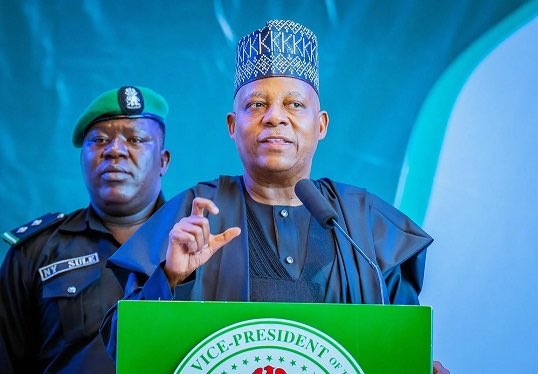When Nigeria’s Vice President Kashim Shettima stood before a global audience at a recent UN summit and declared that the country was “banking on Artificial Intelligence (AI) to boost food security,” it sounded less like a national policy and more like the punchline to a Silicon Valley-themed joke. The same country that can’t keep the lights on now wants to feed its people with code? It would be hilarious if it weren’t so tragically unserious.
Let’s be clear: AI has powerful agricultural applications — in theory. From predictive analytics for crop yields to drone monitoring for irrigation patterns, these tools are revolutionising agriculture in developed economies. But even the most sophisticated AI cannot plant maize on barren land, irrigate with imaginary water, or harvest crops without basic infrastructure. What Nigeria is missing isn’t intelligence, artificial or otherwise, but political will, agricultural investment, and a working system.
This latest declaration is part of a worrying trend among Nigerian officials: treating technology as a shortcut around governance failure. We’ve seen this movie before. Blockchain was supposed to end corruption. Drones were going to monitor oil theft. E-Naira was pitched as financial inclusion’s saviour. Yet here we are, with inflation at a record high, farmers fleeing bandit-ridden farmlands, and millions going to bed hungry. Will ChatGPT fix that too?
The Vice President’s AI fantasy glosses over some inconvenient truths: Nigeria’s broadband penetration barely scratches 45% in rural areas, where farming actually happens; the average Nigerian farmer is over 50 years old and has never operated a smartphone, much less AI tools; Extension services are dead, tractors are in short supply, fertiliser is either overpriced or hoarded, and security forces cannot guarantee safe access to farmlands.
But sure, let’s upload our hopes for food security into the cloud.
AI can assist agriculture, but only when it complements a functioning, mechanized, and secure food production ecosystem. In Nigeria’s case, it’s like designing self-driving cars when you haven’t even built roads. We need irrigation, access to finance, functional cooperatives, subsidized inputs, and peace in farming communities. Without these, talking AI is not just premature, it’s willfully ignorant.
Worse, it is a betrayal of the hungry. Because every time a leader speaks of futuristic solutions while ignoring present suffering, it tells us that those in power are more concerned with optics than outcomes.
Nigeria doesn’t need AI to end hunger. It needs accountability, infrastructure, and leadership that plants policy into the soil, not platitudes into microphones.
Until then, the only intelligence Nigerians will keep encountering is the artificial kind coming from their leaders.























